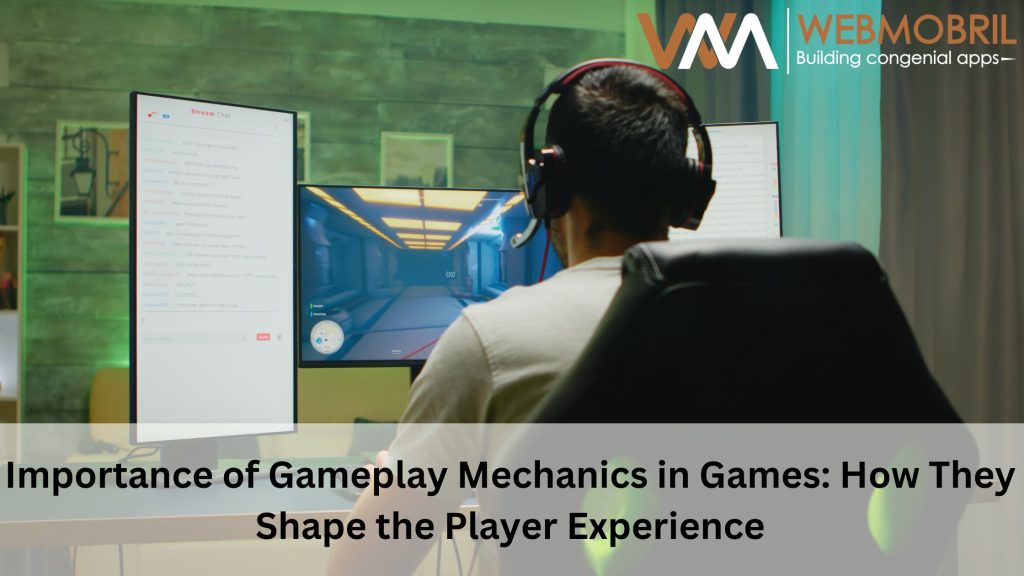Game mechanics bring life to a game and define how players can interact with characters and progress through the game.
It is essentially a set of rules and actions that define how the game is played. As developers look for new ways to create engaging and immersive experiences, gameplay mechanics are evolving.

Understanding game mechanics is essential to crafting a captivating gaming experience.
The role of a game development company or developer is to come up with mechanics that are engaging for players and give them a worthwhile experience.
In this blog, we will explore the importance of gameplay mechanics and the latest innovations in this field. Let us first start by understanding core gameplay mechanics.
What are Core Gameplay Mechanics?
Core game mechanics provide players with a set of responses that define how they interact with the game world. These mechanics mainly include character movements, resource management, level design, combat mechanics and more. The genre of a game also defines its core mechanics.
For example, the core mechanics of an action game would be jumping, aligning the weapons, replenishing the ammunition, hiding behind objects, and throwing explosives.
Similarly, for a sports game the core mechanics would be controlling the character or team in a way that matches the real sports such as passing, dribbling and tackling to score goals in a football game and win matches.
Game mechanics are considered the most crucial element of game development. While the design elements define the looks and sounds of a game, mechanics determine how it feels.
The efficacy of game mechanics is crucial to the success of a game.
Also read: 8 Game Design Principles to Create Immersive and Engaging Gaming Experience
Innovations in Game Mechanics

Innovative mechanics break the mold of traditional gameplay and offer something new to the players. Innovative game mechanics can help a game stand out and attract more players. It often involves exploring new possibilities that have not been tried before. The goal is to push the boundaries and create a more engaging and immersive gaming experience. Here are recent innovations in game mechanics:
Bullet Time: Bullet time is an innovative game mechanic that was first introduced in Max Payne and has since in used in many other games. This allows players to make more precise movements.
Interactive Dialogue: It has been used in many popular games such as Mass effect, Dragon age, and the Witcher series. It allows players to choose how their characters respond to dialogues.
Procedural Generation: It involves generating random game content to create varied game worlds. Minecraft is a popular title that uses procedural generation.
Non-linear Storytelling: It allows players to make choices that explore different scenarios and outcomes. Games such as The Witcher 3 use non-linear storytelling to create immersive narrative.
Dynamic Weather: Changes in the weather based on real-time data or predefined cycles to affect the visuals and atmosphere of the game.
Emotional Intelligence: It is still in the early stages but has the potential to create more immersive and engaging games.
With the advancement in technology, we can expect more innovations in game mechanics in the future.
Benefits of Game Mechanics Design
Game Mechanics Design is an essential part of game development; it has significant impact on the overall experience. There are many benefits of good game mechanics’ design:
- Engagement: They can keep the players engaged by providing a sense of challenge and satisfaction.
- Variety: They provide variety to a game; developers can also introduce new mechanics as the game progresses to provide players with variety.
- Balance: Good game mechanics are neither too easy nor too difficult; they give players a fair chance of winning.
- Accessibility: They are accessible to all players regardless of their skill level.
Conclusion:
Game mechanics are the foundation of every game, providing the rules and systems that define how players interact with the game. From a simple roll of the dice in board games to interaction with objects and characters in AR and VR Games, the careful design of mechanics ensures an engaging experience for players. Furthermore, good gameplay mechanics have many benefits that can create a sense of identity for a game.

